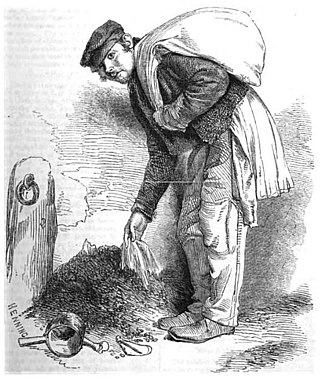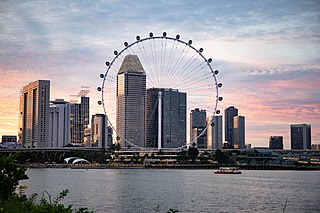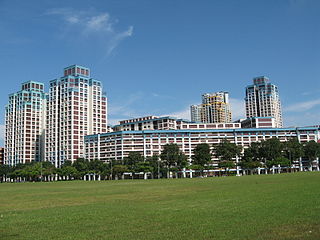
A karung guni, also spelled as karang guni, is a type of scrap dealer in Singapore and Malaysia. Its practitioners are a modern form of rag and bone man that visit residences door-to-door to acquire unwanted items. [1]

A karung guni, also spelled as karang guni, is a type of scrap dealer in Singapore and Malaysia. Its practitioners are a modern form of rag and bone man that visit residences door-to-door to acquire unwanted items. [1]
"Karung guni" is a Malay phrase for gunny sack, which was used in the past to hold the newspapers. The karung guni would haul the heavy sacks on their backs as they walked their rounds to do the collection. Today, most of them use a hand truck instead.
Karung guni either walk along corridors (if that particular HDB estate has a multistorey car park) or for certain HDB estates where the carpark is right under the HDB blocks, walk through the carpark downstairs honking a horn. Around landed properties, they may drive around in a lorry with a horn attached to it, instead of going door-to-door. They make visits in carts, collecting old newspapers and other unwanted items. These will be resold at specialized markets and eventually recycled or reused.
These people can be distinguished by their use of horns or (rarely) hand bell and shouts of "karang guni, poh zhua gu sa kor, pai leh-lio, dian si ki..." ("Rag and bone, newspapers and old clothes, spoilt radios, televisions" in Singaporean Hokkien) when making their rounds. [2] Depending on the person, a nominal fee is paid for the quantity of newspapers or unwanted items sold.
The karung guni industry is made highly profitable due to the dense urban nature of Singapore, where hundreds of public housing apartment units are located in one block, with often a dozen blocks in each housing estate. This gives the karang guni men large access to sources of scrap. [3] There are reported stories of rag-to-riches, karung guni men who have become millionaires just from the karang guni business. [4] Today, however, competition is usually too great due to the over-saturation. [5]
In the past, second-hand items in good condition bought by the karung guni are usually resold in flea markets such at the now defunct Sungei Road, though in recent times some have begun listing items additionally on online auctions. [6] Because karung guni are motivated by the resale value of these materials on the market, there are also reported cases where some collectors have been selective in what to receive from households, even though they may be still recyclable or reusable. [7] [8]
At the beginning of the 21st century, karung guni men have been facing competition due to recycling initiatives and charities that directly collect from residents material to be recycled. [9] [10]

Dumpster diving is salvaging from large commercial, residential, industrial and construction containers for unused items discarded by their owners but deemed useful to the picker. It is not confined to dumpsters and skips specifically and may cover standard household waste containers, curb sides, landfills or small dumps.

The Housing & Development Board, is a statutory board under the Ministry of National Development responsible for the public housing in Singapore. Established in 1960 as a result of efforts in the late 1950s to set up an authority to take over the Singapore Improvement Trust's (SIT) public housing responsibilities, the HDB focused on the construction of emergency housing and the resettlement of kampong residents into public housing in the first few years of its existence.

Homerun is a 2003 Singaporean Mandarin-language period film. A remake of the award-winning Iranian film Children of Heaven, Homerun is a drama about two poor siblings and their adventures over a lost pair of shoes. Set in 1965, the year Singapore separated from Malaysia, the film satirises the political relations between the two countries, leading to its banning in Malaysia.

Bishan, also known as Peck San, Bishan New Town or Bishan Town, is a planning area and matured residential town located at the northernmost portion of the Central Region of Singapore. Statistically, the area is ranked the 38th biggest in terms of geographical size and the 22nd most populated planning area in the country. It is located at the most Central point of Singapore, and it comprises Upper Thomson, Marymount, Shunfu, Sin Ming, Bishan North and Bishan East. There are also many private residential properties in Bishan. Bishan is ranked 15th in terms of population density. Apart from its boundary with the Central Water Catchment in the west, Bishan borders three other planning areas: Ang Mo Kio to the north, Toa Payoh to the south, and Serangoon to the east.

Ang Mo Kio Bus Interchange is located in Ang Mo Kio Town Centre, Singapore. The interchange is within AMK Hub which is in turn linked to Ang Mo Kio MRT station via a pedestrian underpass below Ang Mo Kio Avenue 8. The interchange was opened by Prime Minister Lee Hsien Loong.

A rag-and-bone man or ragpicker or ragman, old-clothesman, junkman, or junk dealer, also called a bone-grubber, bone-picker, chiffonnier, rag-gatherer, bag board, or totter, collects unwanted household items and sells them to merchants. Scraps of cloth and paper could be turned into cardboard, while broken glass could be melted down and reused, and even dead cats and dogs could be skinned to make clothes. Traditionally, this was a task performed on foot, with the scavenged materials kept in a small bag slung over the shoulder. Some rag-and-bone men used a cart, sometimes pulled by a horse or pony.

Bidadari Cemetery is a defunct cemetery in Singapore. It used to serve the Christian, Muslim, Hindu and Sinhalese communities, and accepted burials between 1907 and 1972. The site of Bidadari Cemetery used to be Istana Bidadari, the home of Che Puan Besar Zubaidah, who was the second wife of Sultan Abu Bakar of Johor Istana.

This article shows the notable future developments in Singapore. Most of them are currently under construction with most to be completed within the next five years.

Josephine Teo Li Min is a Singaporean politician who has been serving as Minister for Communications and Information, Minister-in-charge of the Cyber Security Agency and Smart Nation Initiative since 2021. Teo is currently also Second Minister for Home Affairs, a position which she had held since 2017. A member of the governing People's Action Party (PAP), she has been the Member of Parliament (MP) representing the Kreta Ayer–Kim Seng division of Jalan Besar GRC since 2020.

Public housing in Singapore is subsidised, built and managed by the Government of Singapore thorugh the Housing and Development Board (HDB). The majority of the residential housing developments in Singapore are publicly governed and developed, and home to approximately 80% of the resident population. These flats are located in housing estates, which are self-contained satellite towns with well-maintained schools, supermarkets, malls, community hospitals, clinics, hawker centres and sports and recreational facilities. Every housing estate includes Mass Rapid Transit (MRT) stations and bus stops that link residents to other parts of the city-state. Some estates are also complemented by smaller LRT stations which act as a feeder service to the MRT.

Sungei Road is a road in Singapore situated between Serangoon Road and Jalan Besar and runs along the Rochor Canal. The area around Sungei Road formerly housed affluent Europeans and Asians, and many ornately designed buildings were built there. Since the 1930s, the road has been synonymous with Sungei Road laksa and the Thieves' Market, the largest and oldest flea market in Singapore, where locals can shop for old bric-a-brac or second-hand goods. The market was permanently closed on 10 July 2017 for "future residential development use".

12 Storeys is a 1997 Singaporean drama film written and directed by Eric Khoo. It features an ensemble cast of Jack Neo, Koh Boon Pin and Quan Yi Fong. It was screened in the Un Certain Regard section at the 1997 Cannes Film Festival.
Chong Pang is a housing estate located in the subzone of Yishun West along the Sembawang–Yishun boundary in the town of Yishun, Singapore. It was named after the former Chong Pang village. It has precincts of Neighbourhood 1, part of Neighbourhood 7 and private residential areas along Sembawang Road.
The following lists events that happened during 2016 in the Republic of Singapore.

The by-election was concluded on 7 May 2016 and was the 13th of its kind since Singapore's independence. The by-election was to replace the vacant seat after the incumbent MP, David Ong, suddenly resigned due to his extramarital affair.
Dakota Crescent is one of Singapore’s oldest housing estates built by Singapore Improvement Trust (SIT), the government development authority, in 1958.

In Singapore, a town council (TC) is an entity formed by at least one elected Member of Parliament (MP) and appointed residents who are responsible for the day-to-day operations in managing the common property of the Housing and Development Board (HDB) residential flats and commercial property within the town. The sizes and structure of a town council can be changed due to political electoral changes. It is often considered a very limited form of local government that are strictly limited to estate management, and where their members have no separation of powers from the national government. As of November 2020, there are 17 town councils operating in Singapore.
Jolovan Wham is a Singaporean activist. He has previously served as executive director of the Humanitarian Organization for Migration Economics. The International Federation for Human Rights has stated that he has been the target of judicial harassment, while Amnesty International have stated that "Singapore authorities have repeatedly sought to make an example of his activism to deter Singaporeans who might dare criticize the government."
The following lists events that happened during 2022 in the Republic of Singapore.
The adoption of electric vehicles in Singapore is supported by the Singapore government via the Singapore Green Plan 2030 to have new car models required to run on cleaner energy sources and installation of up to 60,000 electric vehicle charging stations. Financial incentives are given to the public for installation of charging points and purchase of electric cars.